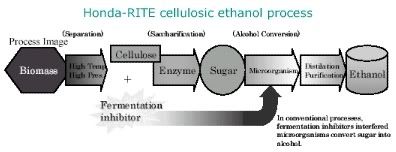Honda achieves breakthrough in technology to produce ethanol from cellulosic biomass
 Very imortant news: Honda Motor Co, one of the most innovative auto manufacturers, announced [official release *.pdf] today it has co-developed the world's first practical process for producing ethanol out of cellulosic biomass in what is a big step towards using non-edible plant materials as fuel. Ethanol is becoming a major source of motor fuel but faces supply limits, as it is produced primarily from sugar and starch of sugarcane and corn feedstock, which are also utilized as food.
Very imortant news: Honda Motor Co, one of the most innovative auto manufacturers, announced [official release *.pdf] today it has co-developed the world's first practical process for producing ethanol out of cellulosic biomass in what is a big step towards using non-edible plant materials as fuel. Ethanol is becoming a major source of motor fuel but faces supply limits, as it is produced primarily from sugar and starch of sugarcane and corn feedstock, which are also utilized as food.The breakthrough comes as automakers look for alternatives to petroleum-based fuels that will not release greenhouse gases that fan global warming. Surging oil prices have also spurred companies to develop new fuels that may be cheaper and not as prone to supply disruptions. "Expansion of biomass utilization holds enormous potential as a major step forward toward the realization of an energy sustainable society," Honda said.
Honda co-developed the new process with the Research Institute of Innovative Technology for the Earth, or RITE, a nonprofit entity set up by the Japanese government and private enterprises, which said the new method allows large volumes of ethanol to be produced from the cellulose and hemicellulose found in widely available biomass waste, such as wood chips, leaves, corn stalks, palm fronds, rice hulls and a whole range of other agricultural residues.
Current technology for converting cellulosic biomass yielded impractically low levels of ethanol due to the interference of fermentation inhibitors with the function of microorganisms that convert sugar into alcohol. The fermentation inhibitors are formed primarily during the process of separating cellulose and hemicellulose from soft biomass.
The new process uses a microorganism [Corynebacterium glutamicum, picture released by Honda] developed by RITE that helps reduce such interference, allowing for far more efficient ethanol production .
The process consists of the following operations:

- Pretreatment to separate cellulose from soft-biomass
- Saccharification of cellulose and hemicellulose
- Conversion of sugar into ethanol using the RITE-microorganisms
- Ethanol refinement
Honda's research unit Honda R&D Co. said it aimed to set up a biorefinery in 2008 at the earliest to test the technology for practical applications. The partners plan to work next on a plant that can produce not only ethanol, but other industrial compounds from plant matter as well:
 ethanol :: bioenergy :: biofuels :: sustainability :: biomass :: residues ::cellulosic :: biorefinery :: Honda ::
ethanol :: bioenergy :: biofuels :: sustainability :: biomass :: residues ::cellulosic :: biorefinery :: Honda :: Ethanol, or ethyl alcohol, is on its way to becoming a mainstream world commodity as soaring prices for crude oil and gasoline push consumers to use more "green" fuels produced from renewable resources.
Ethanol production is also attracting the attention of investors. Producing ethanol from corn yields profit margins of over 20 percent, Yukawa said, citing U.S. government data -- much higher than selling the crop as food. Bio-ethanol is also carbon-neutral since carbon dioxide released by the combustion of the fuel is offset by the CO2 captured by plants through photosynthesis.
Japan hopes to replace about 500,000 kilolitres (3 million barrels) of transportation fuels with bio-ethanol a year by 2010. In the United States, the Bush administration has called for improving technologies in order to reduce U.S. oil imports from the Middle East by three-quarters by 2025.
More information:
Bloomberg: Honda Finds Way to Make Ethanol From Inedible Plants - Sept. 14, 2006
Reutrers: Honda co-develops process to make biomass ethanol - Sept. 14, 2006
AP: Honda develops new way to make biofuel that could boost environmentally friendly cars - Sept. 14, 2006
 -------------------
-------------------
 Spanish company Ferry Group is to invest €42/US$55.2 million in a project for the production of biomass fuel pellets in Bulgaria.
The 3-year project consists of establishing plantations of paulownia trees near the city of Tran. Paulownia is a fast-growing tree used for the commercial production of fuel pellets.
Spanish company Ferry Group is to invest €42/US$55.2 million in a project for the production of biomass fuel pellets in Bulgaria.
The 3-year project consists of establishing plantations of paulownia trees near the city of Tran. Paulownia is a fast-growing tree used for the commercial production of fuel pellets.









0 Comments:
Post a Comment
Links to this post:
Create a Link
<< Home